- Home
- Sharon M. Draper
November Blues Page 2
November Blues Read online
Page 2
“That didn’t make any sense, but I’m not gonna argue with a pregnant woman!” Dana said in a teasing tone.
But the words seemed to sober November. “I’m no woman, Dana. I’m just a kid. I don’t know how to raise a child. I don’t think I can!”
“So you think you’re going to keep the baby?”
November looked up. “I guess. What else can I do?”
“There are lots of options, you know,” Dana said tentatively.
“No. I can’t go there. But the kid deserves better than me,” November replied.
“What do you think Josh’s parents will say when they find out?” Dana suddenly asked.
November looked startled. “I never even thought about them! What would they care?”
“November, Josh was their only child! I have a feeling they would be real interested in a potential grandchild.”
“It’s none of their business,” November said, her jaw set. “This is my problem. I’ll figure it out somehow.” But she knew she was just spouting words. She had no idea what that meant.
That night November shivered as she curled up in bed with her Big Bird stuffed toy that she’d gotten when she was five. She would never let her friends know she still slept with a stuffed animal, but Josh had known. He’d even bought her a little green Kermit the Frog for her birthday last year. When she’d asked him why Kermit, Josh had said, “The frog can keep the bird company while you’re at school, and besides, it will drive Miss Piggy crazy with jealousy!”
They’d giggled and pretended and figured they’d have forever to laugh together. But they didn’t. Kermit was still around to keep Big Bird company, but November knew she was now on her own. She cuddled the well-worn toy and cried herself to sleep.
CHAPTER 4
WEDNESDAY, MARCH 31
AS SHE RODE THE SCHOOL BUS THE NEXT morning, which she hated because she figured she ought to be driving to school by now, November looked out the grimy window and recalled how the local papers and television stations had covered the story of Josh’s death. Even CNN had broadcast it, the reporters shaking their heads at teenage foolishness.
“The death of sixteen-year-old Joshua Prescott has rocked Frederick Douglass High School to its core,” a reporter had cried that Saturday from his post in front of the school, she remembered. They were filming the informal student memorial assembly for Josh. “Young Prescott had been pledging for a school club called the Warriors of Distinction, a highly reputable, long-established organization known for its good deeds in the community. The dark, deadly secrets of the club, however, have become horribly apparent.” November knew she’d never forget how oddly excited the journalists looked, like scavengers after a kill.
One particularly pushy reporter, with her hair so heavily sprayed it didn’t budge in those January winds, had spotted November and jammed her microphone into November’s face while signaling to her cameraman to record.
November had tried to avoid her, hurrying to the corner to catch a bus home, praying it would come soon. Her eyes were swollen from crying, and she had tried to keep her back to the camera, but the reporter had been determined. “Aren’t you Joshua Prescott’s girlfriend? We’re very sorry for your loss, but—”
“You’re not sorry for my loss,” November had interrupted. “People say that all the time. It doesn’t mean anything.”
The reporter, undaunted, had continued, “You’re right, young lady. So, let me ask you—are you angry that the club made him perform that deadly stunt?”
“No, I’m angry that you’re asking me dumb questions!” November had responded, thinking back to how she and her girlfriends had been thrilled that their dudes were going to be in such a hot club, with hookups to parties every weekend and cool privileges like keys to the teachers’ workroom at school.
“Did Joshua share with you any of the dangerous activities the Warriors of Distinction were involved in? Why didn’t you try to stop him?”
November stared at her, incredulous. “How was I supposed to know? It was just supposed to be stupid high school fun,” she had replied, trying again to walk away. But the reporter, and her cameraman, had followed her.
The reporter continued speaking to the camera. “Only club members and pledges knew of the secrets the Warriors of Distinction hid. Not until Prescott’s untimely death did the community find out what really went on.” Excitement rose in her voice. “New members had been made to undergo a series of hazing rituals that included having their heads flushed in a toilet, being dragged around on leashes like dogs, and, on the final night, jumping from a second-story window.”
“Please, leave me alone!” November had begged. The close-up of her crying had appeared on every major news outlet the next morning.
The reporter turned back to the camera. “Fourteen of the fifteen pledges survived Friday night’s ‘Leap of Faith,’ as it was called. Eleventh-grader Joshua Prescott did not.” The reporter kept talking. November had run back into the school and had called her mother to pick her up.
The Warriors of Distinction had been abolished by the school board shortly after Josh’s death, as November knew it probably would be; the club’s faculty adviser had been fired; and at least one of the members, Eddie Mahoney, had received some jail time. Everybody at school felt that Eddie got what was coming to him. He was a nasty piece of work. His cruel comments had made more than a few students miserable. None of this had changed the outcome of that horrible night, as far as November was concerned, but it seemed to put a little salve on the deeply felt wounds of the school.
November hurried off the bus and into the school building. The fumes from the school bus made her feel ill. Even though it was almost April, the air was crisp and chilly, and she shivered as she walked into the main hall. A picture of Josh, the frame trimmed in black, still hung prominently near the main office. She automatically turned her head away so she wouldn’t have to see that infectious smile, those eyes that crinkled mischievously. Josh was the only person she knew whose school picture had actually captured his personality.
She went to her locker, got her books out for the morning, and tried to get her thoughts together. She regretted the blueberry yogurt granola bar she’d eaten on the school bus; her stomach was churning. Just as she closed her locker, she felt her stomach heave. She covered her mouth, rushed across the hall to the girls’ bathroom, and made it to a stall just in time to throw up seemingly everything she had eaten since the third grade.
“You okay in there?” she heard a voice ask.
“Yeah, I’m fine,” November managed to reply. “I got the flu. That’s all.” November wiped her mouth with toilet paper and leaned her head against the cool surface of the bathroom stall. The smell was horrible, even after she flushed.
“Stinks,” the voice stated flatly.
“Why don’t you mind your own business?” November replied angrily.
“I got breath mints if you need ’em,” offered the voice.
“Just leave me alone,” November pleaded. She heaved once more and gagged on nothing.
“You want me to call the nurse?”
“No, please don’t. I’ll be okay.” November took a couple of deep breaths and felt a little less queasy. “But thanks anyway.” She glanced under the stall door and saw the ugliest pair of shoes she’d ever laid eyes on. They were scuffed gray leather with rounded toes and faded blue laces. She waited until she heard the girl’s footsteps leave the bathroom, then opened the stall door. She looked in the mirror. She’d lost quite a bit of weight after Josh’s death, and she looked thin, unhealthy, and weak.
“School mirrors always make you look bad, anyway.” It was that voice again.
November whirled around, surprised that the girl had returned. The girl’s large brown face, pulled taut by tightly braided cornrows, was peppered with acne. “Aren’t you supposed to be in class?” November asked her.
“Aren’t you?” the girl tossed back.
“I’m sick. I’m going hom
e. What’s your excuse?”
“I was worried about you.”
November didn’t know what to say to that. She looked at the girl suspiciously. Finally she asked, “Me? Why?”
“You sounded pretty bad in there. I wouldn’t have slept tonight if you had dropped dead or something and I hadn’t come back and tried to help you.” The girl shrugged and tossed her book bag onto the floor.
November smiled thinly. “That’s pretty cool of you. But I’ll be okay.”
“Whatever.” The girl shrugged.
“You’re, uh, Olivia, right?” November made a face, trying to remember the girl’s last name. “I’m November Nelson.”
“I know who you are. I’m in your first-bell American history class. Sergeant Fox, the king of worksheets and quizzes.”
Embarrassed, November looked at the girl closely. “Uh, I’m sorry. I usually use that class to finish my morning nap.”
“You should sit in the back like me. Easier to catch those z’s.” She smiled. “I’m Olivia Thigpen. An unfortunate name, I must admit, since I’ve had to endure stupid boys saying ‘Oh-liv-in-a pigpen’ as they made oinking sounds.”
Olivia was noticeably overweight, but compact, as if her clothes had been neatly stuffed with extra substance. She wore a massive boy’s football jersey that came down to her knees and a well-packed pair of blue jeans. And then there were those unfortunate-looking shoes. She wore no makeup on her cocoa brown face, and her very high cheekbones and dimples were things November could only wish for. She grinned at November warmly.
“Oh, yeah, I know you,” November said weakly. But Olivia was one of those girls who sat in the back of every classroom, never joined in hallway conversations, never caused a scene or did anything to bring attention to herself, the type easily ignored by girls like November and Dana. “Aren’t you in the band?” November asked. She vaguely remembered a concert her friend Jericho had once played in. She knew that Jericho, Josh’s cousin and very best friend, grieved deeply for him as well. The two had been as close as brothers.
Olivia brightened. “Yeah! I play the tuba in concert band, but the sousaphone in marching band. Tubas aren’t good for marching,” she explained.
“I don’t think I could handle either one,” November said frankly. “They’re awfully big suckers to lug around.”
“Yeah, but I do my best to keep a low profile. Well, as low as I can, seeing how I’m the biggest thing in the eleventh grade!” Changing tones, she added, “Everybody and their sister knows you, November. You the bomb, girl. You got millions of friends, and you used to go with Josh Prescott.”
“The only thing you’re right about is the Josh part,” November replied. “It’s hard to get over the fact that he’s never coming back.” She felt like she might cry.
“He was always nice to me, you know. In fifth grade, he knocked a boy down who was making fun of me, then he did a little jig on the boy’s backpack. I’ll never forget that.”
“Yeah, that was Josh—making the world go ’round.” November felt another wave of nausea and rushed back into the stall. The flushing toilet echoed loudly, to November’s further embarrassment.
But Olivia said nothing when November reemerged from the stall. “You sure you don’t need the nurse?” she finally asked.
“That little old lady can’t help me,” November replied sullenly. “By law all she’s allowed to give out to kids are bandages and tissues and candy. She can’t even slide anybody a cough drop, let alone an aspirin.” She rinsed her face with cold water, while Olivia watched her silently.
“You’re pregnant, aren’t you?” Olivia finally asked bluntly.
November looked at Olivia in the mirror, astonished. “I don’t know what you’re talking about.”
Olivia shrugged. “Forget I asked. It’s none of my business, anyway.” She picked up her bag to leave.
November suddenly felt the need to talk to someone, even an almost stranger like Olivia, and before she could stop herself, she put her hand out and touched the other girl. She glanced around the small bathroom, making sure no one else was in there with them. “You’ve got to promise not to tell anybody,” she said, her voice low.
“Who’s gonna listen to me, anyway?” Olivia replied with a shrug. Her look then turned serious. “But for real, girl, you know that this is the kind of secret you can only keep for a little while.”
“I keep feeling like if I don’t think about it, it won’t be true, and everything will go back to like it used to be.”
“Not gonna happen. You’ve got to deal with this. Have you seen a doctor?”
November blinked. “Oh, I couldn’t. Not yet.”
It was Olivia’s turn to look astonished. “Well, that’s stupid. You have to get yourself checked as early as possible. Don’t you have a brother who’s disabled or retarded or something?”
“How do you know that, and what business is it of yours, anyway?” November retorted, her voice hard with resentment.
“I couldn’t care less. You gave a report in English class last year—remember? You talked about how you volunteered at Stepping Stones every summer, working with the handicapped kids, and how your brother’s disability got you involved in the program.”
“You remember that report?” November looked amazed.
“I can’t help it, I never forget anything—it’s a blessing and a curse. I can tell you what I had for dinner two months ago, and the lyrics to every single rap song ever produced—and that’s a mouthful, I can tell you! I remember that report because you were, like, straight up—you know what I’m sayin’? Lots of folks don’t like to talk about people in their family with mental or physical screwups.”
November told her quietly, “His name is Augustus. We call him Gus.”
“Born in August?”
November nodded.
“Your mama got issues with names, girlfriend.”
November laughed. She took out her lipstick and tried to add a bit of color to her sallow face. “You got that right.”
Olivia picked up her backpack again and slung it over one shoulder. “Well, I better get to class. If you need to talk, I’m here. I’ve been around the block more than you might expect. Here’s my cell number.”
November took the number and leaned against the bathroom wall. As she watched Olivia saunter out, she entered the number into her cell phone. She thought about the girl’s unexpected kindness; then, for no reason she could explain, she started to cry. She slid down to the cold concrete floor and sat there sobbing until the bell rang.
CHAPTER 5
JERICHO PRESCOTT
THURSDAY, APRIL 1
“HOW’S IT GOING, JERICHO?” JERICHO looked up from digging for a book in his locker. It was Mr. Tambori, his music teacher.
“I’m hangin’,” Jericho mumbled, turning back around. He dug in his locker again, pulled out his history book, and avoided the music teacher’s eyes.
“It’s been a couple of months since you’ve come for your trumpet lesson. Are you ready to start up again? I still have every Wednesday at three o’clock free just for you if you’d like to try loosening up the keys a little.”
“I don’t even know where my trumpet is, man.”
“The trumpet you named ‘Zora’ and carried around with you twenty-four/seven? I have a feeling you know exactly where it is.”
Jericho sighed. “I tossed it under my bed a couple of weeks after Josh’s funeral. I guess it’s still there. When I look at it, all I can think about is Josh and how he’s never gonna hear music again. And I just can’t put it to my lips. I’m too big to be cryin’.”
Mr. Tambori put his hand gently on Jericho’s shoulder. “I understand, son. I really do.”
Jericho twisted away from the teacher’s touch. “No, you don’t. Don’t nobody know how I feel!”
“You can’t blame yourself, Jericho,” Mr. Tambori said, kindness and patience in his voice. But Jericho didn’t want kindness.
“Then who, Mr.
T?” demanded Jericho. “I told him to jump. I cheered him on, then stood there like a fool and watched him die. I will never forgive myself.”
“Music will help you work this out, Jericho. Let your trumpet speak for you. Give Zora a chance.”
“I know what you tryin’ to say, Mr. T, and I appreciate it. For real I do,” Jericho said. “But right now every day I feel like I got rocks in my gut. I need more than music. I need Josh back.”
Mr. Tambori nodded. “The music will be there when you’re ready, Jericho. I know jazz is your specialty, but you know your place in the marching band next year is always there for you.” He hesitated a moment, then added, “Maybe the necessary precision and strict rules will add a bit of order to your life. We need your talent, Jericho.”
“I’ll think about it, Mr. T,” Jericho said as he hoisted his book bag on his back. “But the football coach has been talking to me about coming out for the team. Maybe I need a change. All I’d have to do is sweat and run and tackle.”
“Football?” Mr. Tambori asked, sounding shocked. “Have you ever played before?”
“I played all through middle school—defensive end. Actually, I was pretty good, but I got lazy. Coach has been after me since I got here in ninth grade, but I always blew him off. But I’m six-three and I weigh two-sixty, man. All the dudes on the team tell me they could use me on the line.”
“Make sure you’re making your decisions for the right reasons, Jericho,” the teacher warned.
“Ain’t nothin’ right these days, man. Nothin’ at all,” Jericho said sadly as he walked away.
CHAPTER 6
THURSDAY, APRIL 1
JERICHO PUSHED THROUGH THE CROWDED hallway, head down, a scowl on his face. He went to school because it was required, because it kept him busy, because it was a break from sitting at home every day feeling sorry for himself. But he rarely smiled, said as little as possible to teachers and friends, and kept his grief bottled up inside him. Some days he felt like he would implode.

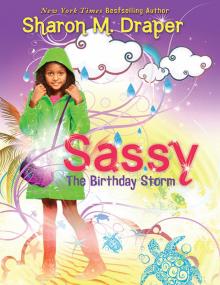 The Birthday Storm
The Birthday Storm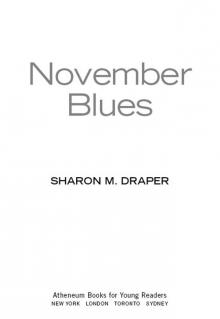 November Blues
November Blues The Backyard Animal Show
The Backyard Animal Show Copper Sun
Copper Sun Romiette and Julio
Romiette and Julio The Sassy Collection
The Sassy Collection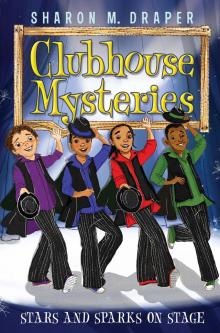 Stars and Sparks on Stage
Stars and Sparks on Stage The Battle of Jericho
The Battle of Jericho Tears of a Tiger
Tears of a Tiger The Dazzle Disaster Dinner Party
The Dazzle Disaster Dinner Party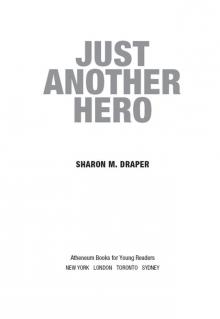 Just Another Hero
Just Another Hero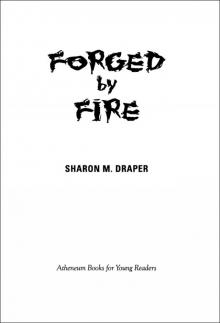 Forged by Fire
Forged by Fire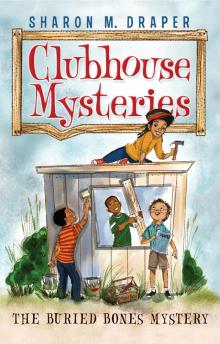 The Buried Bones Mystery
The Buried Bones Mystery Out of My Mind
Out of My Mind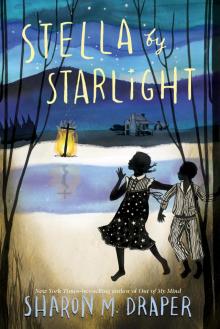 Stella by Starlight
Stella by Starlight Panic
Panic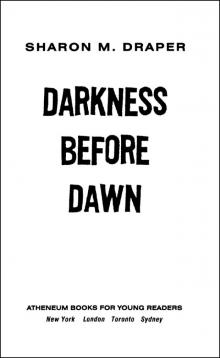 Darkness Before Dawn
Darkness Before Dawn The Space Mission Adventure
The Space Mission Adventure Double Dutch
Double Dutch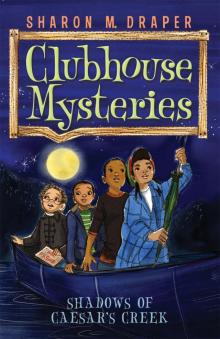 Shadows of Caesar's Creek
Shadows of Caesar's Creek